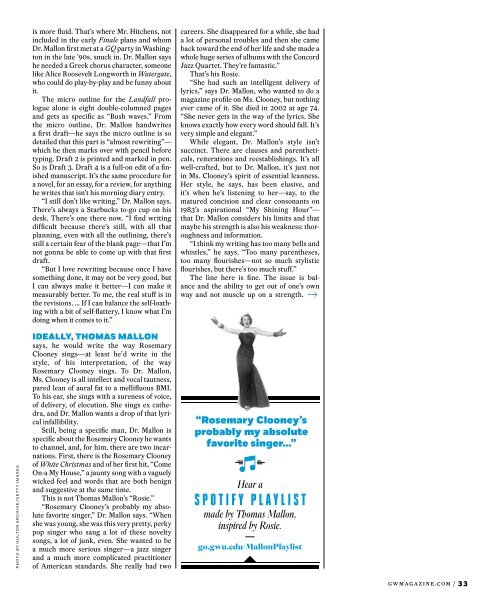Create successful ePaper yourself
Turn your PDF publications into a flip-book with our unique Google optimized e-Paper software.
PHOTO BY HULTON ARCHIVE/GETTY IMAGES<br />
is more fluid. That’s where Mr. Hitchens, not<br />
included in the early Finale plans and whom<br />
Dr. Mallon first met at a GQ party in Washing<strong>to</strong>n<br />
in the late ’90s, snuck in. Dr. Mallon says<br />
he needed a Greek chorus character, someone<br />
like Alice Roosevelt Longworth in Watergate,<br />
who could do play-by-play and be funny about<br />
it.<br />
The micro outline for the Landfall prologue<br />
alone is eight double-columned pages<br />
and gets as specific as “Bush waves.” From<br />
the micro outline, Dr. Mallon handwrites<br />
a first draft—he says the micro outline is so<br />
detailed that this part is “almost rewriting”—<br />
which he then marks over with pencil before<br />
typing. Draft 2 is printed and marked in pen.<br />
So is Draft 3. Draft 4 is a full-on edit of a finished<br />
manuscript. It’s the same procedure for<br />
a novel, for an essay, for a review, for anything<br />
he writes that isn’t his morning diary entry.<br />
“I still don’t like writing,” Dr. Mallon says.<br />
There’s always a Starbucks <strong>to</strong>-go cup on his<br />
desk. There’s one there now. “I find writing<br />
difficult because there’s still, with all that<br />
planning, even with all the outlining, there’s<br />
still a certain fear of the blank page—that I’m<br />
not gonna be able <strong>to</strong> come up with that first<br />
draft.<br />
“But I love rewriting because once I have<br />
something done, it may not be very good, but<br />
I can always make it better—I can make it<br />
measurably better. To me, the real stuff is in<br />
the revisions. … If I can balance the self-loathing<br />
with a bit of self-flattery, I know what I’m<br />
doing when it comes <strong>to</strong> it.”<br />
IDEALLY, THOMAS MALLON<br />
says, he would write the way Rosemary<br />
Clooney sings—at least he’d write in the<br />
style, of his interpretation, of the way<br />
Rosemary Clooney sings. To Dr. Mallon,<br />
Ms. Clooney is all intellect and vocal tautness,<br />
pared lean of aural fat <strong>to</strong> a mellifluous BMI.<br />
To his ear, she sings with a sureness of voice,<br />
of delivery, of elocution. She sings ex cathedra,<br />
and Dr. Mallon wants a drop of that lyrical<br />
infallibility.<br />
Still, being a specific man, Dr. Mallon is<br />
specific about the Rosemary Clooney he wants<br />
<strong>to</strong> channel, and, for him, there are two incarnations.<br />
First, there is the Rosemary Clooney<br />
of White Christmas and of her first hit, “Come<br />
On-a My House,” a jaunty song with a vaguely<br />
wicked feel and words that are both benign<br />
and suggestive at the same time.<br />
This is not Thomas Mallon’s “Rosie.”<br />
“Rosemary Clooney’s probably my absolute<br />
favorite singer,” Dr. Mallon says. “When<br />
she was young, she was this very pretty, perky<br />
pop singer who sang a lot of these novelty<br />
songs, a lot of junk, even. She wanted <strong>to</strong> be<br />
a much more serious singer—a jazz singer<br />
and a much more complicated practitioner<br />
of American standards. She really had two<br />
careers. She disappeared for a while, she had<br />
a lot of personal troubles and then she came<br />
back <strong>to</strong>ward the end of her life and she made a<br />
whole huge series of albums with the Concord<br />
Jazz Quartet. They’re fantastic.”<br />
That’s his Rosie.<br />
“She had such an intelligent delivery of<br />
lyrics,” says Dr. Mallon, who wanted <strong>to</strong> do a<br />
magazine profile on Ms. Clooney, but nothing<br />
ever came of it. She died in 2002 at age 74.<br />
“She never gets in the way of the lyrics. She<br />
knows exactly how every word should fall. It’s<br />
very simple and elegant.”<br />
While elegant, Dr. Mallon’s style isn’t<br />
succinct. There are clauses and parentheticals,<br />
reiterations and reestablishings. It’s all<br />
well-crafted, but <strong>to</strong> Dr. Mallon, it’s just not<br />
in Ms. Clooney’s spirit of essential leanness.<br />
Her style, he says, has been elusive, and<br />
it’s when he’s listening <strong>to</strong> her—say, <strong>to</strong> the<br />
matured concision and clear consonants on<br />
1983’s aspirational “My Shining Hour”—<br />
that Dr. Mallon considers his limits and that<br />
maybe his strength is also his weakness: thoroughness<br />
and information.<br />
“I think my writing has <strong>to</strong>o many bells and<br />
whistles,” he says. “Too many parentheses,<br />
<strong>to</strong>o many flourishes—not so much stylistic<br />
flourishes, but there’s <strong>to</strong>o much stuff.”<br />
The line here is fine. The issue is balance<br />
and the ability <strong>to</strong> get out of one’s own<br />
way and not muscle up on a strength.<br />
“Rosemary Clooney’s<br />
probably my absolute<br />
favorite singer...”<br />
Hear a<br />
SPOTIFY PLAYLIST<br />
made by Thomas Mallon,<br />
inspired by Rosie.<br />
go.gwu.edu/MallonPlaylist<br />
gwmagazine.com / 33


